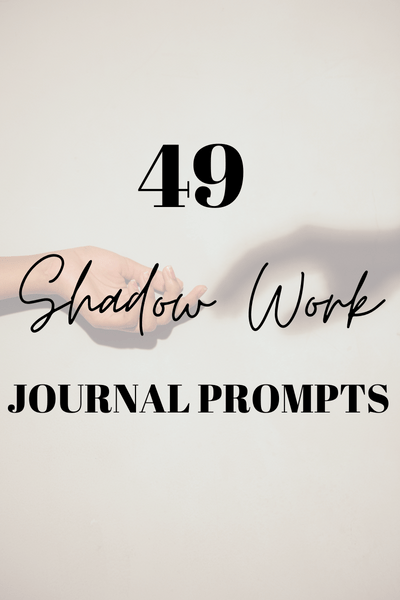This post may contain affiliate links. Disclosure here.
Shadow work can sound a little dark and scary at first but I promise you it is the best tool for healing and growth. Shadow work is mainly done in the form of journaling using specific shadow work journal prompts and questions.
Use these journal prompts help you dig deep and uncover your limiting beliefs, insecurities, past trauma and more.

Using these journal prompts can help you uncover subconscious beliefs, traumas and anything you hold deep within yourself.
These subconscious beliefs are what run our lives without us even knowing!
I did a post on Shadow Work for Beginners that will give you more insight into what shadow work really is and how to get started.
How to start using shadow work journal prompts:
There are no rules or order to go in when using these prompts. Pick the ones that will benefit you the most and work through the prompts.
Make sure you are honest and open with yourself and pay attention to any feelings and thoughts that come up, even if it doesn’t make sense or is uncomfortable.
Shadow Work Journal Prompts for Healing and Personal Growth
What is shadow work?
Shadow work is the practice of facing and accepting your dark side.
By working with our shadow selves, we can heal old wounds, gain clarity about our current relationships, and grow into new ways of being in the world.
In this post we’ll explore some of the different ways that you can use journaling prompts to engage with your shadow side, as well as discuss how it might benefit you!

What makes you happy?
- What do you enjoy doing?
- What makes you happy?
- What are your hobbies?
- What are your interests?
- What do you like to do in your free time?
How would you describe your best qualities?
Furthermore, once you’ve identified your best qualities, take a moment to write about what makes you a good friend, parent, partner, employee and boss/leader.
If you could stop time and make this moment last forever, how would you spend it?
- If you could stop time and make this moment last forever, how would you spend it?
- What do you need to do to make that happen?
What are three things that scare you right now?
- Fear of failure
- Fear of being judged
- Fear of being alone
- Fear of being vulnerable
- Fear of the unknown
You might be surprised by how many fears you have, but everyone has at least a few. There are so many fears in our world that it’s impossible to know them all; however, there are some common fears that most people share.
In addition, a common fear, is the fear of failure, which can be especially difficult for creative types because we’re constantly putting ourselves out there and trying new things.
Many people fear being judged by others. Are you working on something in particular right now?(like a project or a career change)
If so, consider which other fears might be holding back your progress.
Are you afraid of what your family or friends might think or say?
What makes you sad? What’s something that’s made you cry recently?
- What makes you sad? (I am super sensitive and literally anything can make me sad depending on the moment…write down what makes you feel sad often)
- What is something that has made you cry recently? What was it?
- How do you think about it?
- What do you tell yourself when this happens, if anything at all?
- How does it feel to be sad, as opposed to other emotions like anger or happiness

What does it feel like when you laugh until your belly hurts?
Imagine this: You’re laughing so hard that it hurts to breathe. Your sides are sore from all the giggling, and you have a big smile on your face that just won’t go away.
What is making you laugh so hard?
Why is laughter important?
Laughter is good for your heart, and it helps you relax. Also, it helps you connect with other people by making them feel good and happy around you.
Laughing until my stomach hurts is one of my favorite ways of releasing stress and tension, but I also make sure that I don’t turn into an emotional wreck when things aren’t going the way I want them too (and they never do).
When did you last smile at someone for no reason other than the fact that they were there?
We all have a tendency to get caught up in our own lives, but it’s important to make time for others.
Smiling at someone is a simple act that can brighten their day and yours as well.
In conclusion, you don’t have to be friends with someone or even know them very well in order to smile at them; sometimes you might smile at a stranger on the street, or greet someone with a warm, welcoming smile.
Nothing really matters as much as we think:
I used to feel self-conscious and judged by certain people. In one instance, I started smiling and saying “Hi!” to people I used to feel intimidated to and guess what…that specific person became just as anxious and awkward as I used to feel. It made me feel so much better!
It doesn’t matter who it is that makes you smile—the important thing is that they’re there for you when life gets tough (and trust me: life always gets tough).
So go ahead! Go out and find something/someone new to smile at today!
Just be you and do your own thing.
What do you tell yourself when you look in the mirror on your worst days?
The purpose of this reflection is to get you thinking about the negative things you tell yourself when you look in the mirror. What do I mean by “negative”?
Anything that doesn’t help you feel good about yourself, such as self-criticism or a pattern of negative self-talk.
You may find it helpful to think about this question in terms of your overall self-worth, or what value or worth you place on yourself as a person.
Do these messages motivate, inspire and uplift? Or are they critical and judgmental?
Choosing to move on from your negative thoughts:
How might your answer change if someone else were listening in on them?
One example could be “I’m ugly,” whereas another might be “I’m too heavy/skinny/tall/short/fat.” These kinds of thoughts can lead to low self-esteem and poor body image.
If you find yourself struggling with this you should add these positive affirmations for confidence and self-esteem into your self-talk.
If someone else were listening in on those thoughts, would they think better or worse of who we are as a person based upon what we’re saying about ourselves?

Photo by Tasha Kamrowski on Pexels.com
Who is someone who has made a difference in your life, and why?
This is a question that I ask all of my life coaching clients. I ask them to reflect on this in their shadow work journal prompts because the answers vary from person to person, but there are always some commonalities.
The important thing here is identifying the qualities that make someone a good caregiver, and then trying to incorporate them into your own life.
In general, what makes for a good caregiver? It can be something as simple as having patience or being flexible with their schedule.
Other times it means listening carefully; maybe even remaining silent while taking in the other person’s words before offering advice.
It also helps if they have an open mind about the situation at hand; sometimes we don’t need solutions presented to us right away—we just need someone who understands where we are coming from before providing solutions.
Do try to avoid making mistakes or do you have a system for learning from them?
Mistakes are a part of life. We learn from them and move on, but many people ignore their mistakes or try to pretend they didn’t happen.
If you find yourself making the same mistake over and over again, it’s time to change something.
Maybe the way you approach tasks needs adjusting or maybe the task itself needs changing so that it doesn’t cause stress or anxiety for you.
You don’t have to be perfect at everything—in fact, no one is! It’s better to make mistakes than it is not even try because if I fail at something I’ll know what not to do next time around and if I succeed then great!
Using positive affirmations can be a huge benefit to anyone wanting to improve their confidence and overcome their past.
In what ways does engaging with your shadow side help empower and heal you?
Shadow work is a process of embracing and integrating the parts of yourself that you have rejected or disowned. It can be done through journaling, meditation, and other forms of self-reflection.
This type of work allows you to heal past traumas, wounds, and old wounds.
By facing these aspects within yourself and working through them in a safe manner, you become more whole as an individual.
Shadow work journal prompts|
Below are some questions you can use to guide your shadow work journaling. You may want to answer them once a day, every few days, or once a week as you see fit.
Remember that this is about exploring what’s going on for you and not comparing yourself to others or being overly critical.
If at any point in the process you feel uncomfortable or tempted to stop writing, take note of that feeling and then set it aside so that you can return with fresh eyes later on.
Here is a list of additional shadow work prompts:
- How do you think people see you?
i) How do you think others would describe you?
ii) How do you feel about that? - What is the very worst emotion to experience for you personally? Why? Where does that come from? (Betrayal, unworthiness, embarrassment etc.)
- What types of things do you judge others for?
i) Truly think about traits you dislike, look down on and judge other people for. - When is the last time you felt let down? Who let you down? Why did this hurt you?
- What are your core values in life?
i) Are you living in alignment with them? What could you change to be more in harmony with them?
ii) Do they match those of your childhood caregivers?
iii) If not, explore why this might be. - What makes you feel empty? How do you tend to fill that void?
i) What are some healthy strategies you might develop to overcome feelings of emptiness? - Do you have any coping mechanisms or habits you know are bad for you?
- Who has the most influence/power over you?
i) Do you think this is healthy? - Is there anyone you are jealous of?
i) Why are you jealous of them? - What does having “freedom” mean to you?
- What is it in life that gives you a feeling of purpose?
- Make a list of what you think are your best qualities? Make another list of what you think are your worst qualities? Why do you think you either like or dislike these qualities?
- What makes you feel valued and important?
- What would you most like to be looked up to for?
- Who has hurt you the most in your life?
i) Write them a letter telling them all the things you’d like to say. BONUS TIP: After you write this letter, burn it and release all the hurt and emotions you are holding as you watch the letter be destroyed. - What are you most afraid of?
i) Where do you think this fear comes from? - What misconception do people believe about you?
i) How does that make you feel? Does their perception of you truly matter to you? and why?
- Do you generally feel like you are equal to others, less than or better than? Give a list of reasons why you feel this way.
- What memories bring you embarrassment and shame?
i) Brainstorm who you were then, what led to your actions, and how you have changed since then. - Do you similar trait or traits do you share with your parents/childhood caregivers?
i) Did you choose these traits? In what ways would you like to be like them?
ii) Is there any ways you want or choose to be different than them? Why? - What makes you feel like you have failed?
- Think about unhealthy relationships you have currently or have had previously. What’s the common theme?
i) Why do you think you find yourself in this type of situation?
ii) How can you change this dynamic in your life? - What emotions tend to bring out your worst traits? Why?
- When have you been self-sabotaging and destructive in your life?
i) How you were feeling at the time, and what triggered your behaviour, what circumstances might have led to this behaviour? - With whom or in which situations do you find yourself slipping on a mask or embodying a different persona?
i) What do you think would happen if you were 100% your authentic self? - Make a list of what you think to be your most negative, undesirable traits?
i) Where do you think they come from?
i) Do you think these traits served a purpose in the past? - Think about your friendships. Which ones make you feel safe, secure, and loved?
- Do you have any friendships past or present that make you feel bad in any way? Why?
- What are patterns in your life that seem to always repeat? (Could be having bad relationships, overbearing bosses, dead-end jobs etc.)
Conclusion
If you have trouble getting started with a journal, check out this post on how to start a shadow work journal for beginners and use these shadow work journal prompts for healing and personal growth! Do your shadow work and let’s start creating a life we love!
Leave a Reply